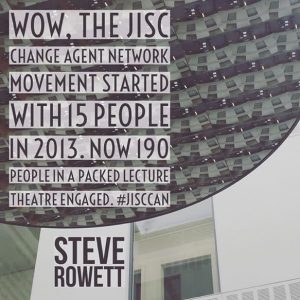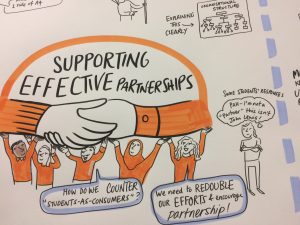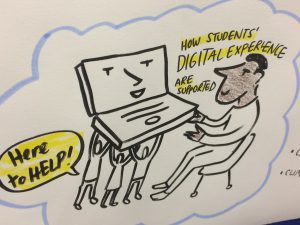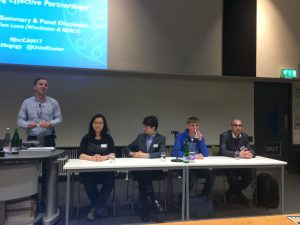I was privileged to work with the University of Exeter this year to organise the 5th annual conference of the Change agents’ network. The conference which took place on the 20 – 21 April was attended by 180 staff and students from universities and colleges across the UK. This year’s theme, Supporting effective partnerships, was fitting for we now see student-staff partnerships as accepted practice in supporting innovation in our students’ experience, whether that be in curriculum design, supporting the development of staff and student digital capabilities or as researchers. What makes CAN conferences unique, is that all sessions involved students as presenters and facilitators. We were able to capture a graphic recording of the conference and our thanks go to Sandra Howgate (@SandraHowgate) for her brilliant work. You can view all the recordings, presentations and resources from day 1 and day 2.
Students as change agents and student partners
Student ‘change agents’ are students who work in partnership with staff to lead, support or develop change within an institution. The 2016 UCISA Digital capabilities survey reports that 43 % of respondents are working with students as change agents with another 38 % of respondents working towards this. There are different ways change agents can work from leading their own change project to supporting a defined project or taking part in institutional processes such as recruitment and teaching practice observations. Titles may differ across higher and further education and include champions, change agents, digital leaders, student fellows, student ambassadors, student partners, student researchers, co-designers, co-creators, co-developers. For further guidance and examples of how colleges and universities are taking this forward, see our Jisc online guide on Developing successful student partnerships
CAN has come of age

From its creation in 2013 with Simon Walker and Mark Kerrigan hosting the first network get together with 20 staff and students at the University of Greenwich, to 2014 when the University of Winchester with Yaz El Hakim and Tansy Jessop, hosted the 2nd conference with 70 staff and students, to CAN2015 when we came together in Birmingham with over 100 staff and students, to CAN 2016 hosted by Marcus Elliott, Emily Parkin and Reece Horsley at the University of Lincoln with 175 staff and students to CAN 2017 at the University of Exeter with Jake Hibberd. It was fitting for CAN to return to Exeter as in 2010, the first national Student and Staff Conference with Liz Dunne, which was held there in conjunction with ELESIG with support from Jisc.
Over the years I have been seen how student staff partnerships have grown to become established practice from the pockets of often project-based initiatives. This year it was evident how colleges and universities are embracing the true meaning of partnership:
“Partnership is fundamentally about a relationship in which all involved – students, academics, professional services staff, senior managers, students’ unions and so on – are actively engaged in and stand to gain from the process of learning and working together. Partnership is essentially a process of engagement, not a product. It is a way of doing things, rather than an outcome in itself.”
Healey, M., Flint, A. and Harrington, K. (2014) Engagement through partnership: students as partners in learning and teaching in higher education. York, Higher Education Academy. Available at: http://bit.ly/1gztC3u
Senior leadership for student partnerships
Over the two days of the conference, we saw how senior leaders are strong advocates for student partnerships with University of Exeter Professor Tim Quine, Deputy Vice-Chancellor (Education) and Mike Shore-Nye, Registrar and Secretary showing their support. With over 50 colleges and universities presenting their innovative work, there were excellent examples of institutional practice. What struck me the most, was how confident and articulate student presenters were on sharing their work and more importantly the benefits they had gained from their experiences. The wordle below illustrates the benefits students have realised on working as change agents or student partners in their organisations.

My highlights

The sessions I attended illustrated the true meaning of partnership – with students being co-presenters and often leading the sessions, showing excellent facilitation skills.
Highlights for me included the day 2 keynote with Colin Bryson and Fanni Albert on Authentic Partnership – what, how and why? which encouraged us to question and challenge the true meaning of partnership and what it actually means to students.
Creating Strong Student Partnerships at UCL – Janaina Hirata, Sandra Lusk, Jenny Marie, Anoodth Naushan & Robert Vilkelis (University College London) ran an excellent workshop on their work as change makers and demonstrated brilliant facilitation skills in leading the discussions around the challenges of partnerships.
MAD Digital Challenge; a Student Call to Drive Change – Vikki Liogier, Kristian Stopher, Brad Forsyth, Jeremy Scale & Deividas Balcunias (Epping Forest College) gave an excellent overview of their innovative approaches to collaborating with students to share their ideas on how technology can support their student experience. Vikki based this work on the Jisc Summer of Student innovation and the use of the Jisc elevator site to gather student ideas which other students then voted for. Vikki’s students were open and honest about what worked well and what didn’t work so well – what was clear to see is how much they had benefitted from working in partnership with Vikki and other staff on this project.

I was really interested in the Power of Partnerships; using data collaboratively to enhance the student experience workshop run by Emily Parkin, Jennifer Barnes, Scott Mcginn and John-Paul Dickie (University of Lincoln) as this tied in with our Jisc work on our student digital experience tracker – a survey of students’ expectations and experiences of technology. This session generated excellent discussions on the differences across institutions in terms of central versus distributed models for control and monitoring of student surveys. The tension still between using online and paper based surveys, and the opportunities for data to be joined up so we can have a holistic overview of student engagement data.
I enjoyed hearing from Graham Lowe and Jack Hogan (Birmingham City University) on their collaborative project with universities in Birmingham to create the Birmingham Digital Students – Student-Staff Partnership in a Digital Age. This is building on the spirit of CAN to facilitate a regional network across Birmingham to share practice in how students and staff are working in partnership on digital projects.
Student panel

The conference ended on a high with our student panel chaired by Tom Lowe, project manager for the REACT project with:
• Brad Forsyth, Epping Forest College
• Kiu Sum, University of Westminster
• Jack Hogan, Birmingham City University
• Mauro Cozzi, University of Southampton
• Angela Dela Fuente, Portsmouth College
• James Ward, Aberystwyth University
• Robert Vilkelis, UCL
• Przemek Komarnicki, University of Derby
The students were asked, what skills and experience have you gained or how have you benefited from working on a student-staff partnership project?
You can view the recording of the panel session here and its definitely worth a view to hear the passion and enthusiasm with which these students spoke about their experiences. These students are brilliant ambassadors for their universities and colleges.
Where next?
Our thanks go to all staff and students who attended, presented and shared their experiences of partnership and made CAN2017 such a success. We have had some excellent feedback from students who participated which shows the benefits of CAN:
‘To me, it was a deep honour presenting at such an amazing conference. I did not only gain experience in presenting and learned a lot from others, but had the opportunity to meet with and talk to so many wonderful people!’
Fanni Zsófia Albert, post graduate student, University of Newcastle
‘I have kept in touch with many of the people I met and I’m sure those relationships alongside the ideas discussed during the conference will be the seed for many great things!’
Mauro Cozzi, undergraduate student, University of Southampton
‘It has been a fantastic 2 days and great to have seen the development of Jisc and the impacts it has on student engagement for past 3 years! Thank you for the opportunity to present and share my experiences from presentation, poster and the student panel. Never thought I would be doing it when I first began my projects.’
Kiu Sum, Final year student, University of Westminster
I am delighted to announce that 6th annual Change agents’ network conference, Championing Student-Staff Partnerships in an Age of Change, will be hosted by the University of Winchester on the 19-20th April 2018 so we look forward to continuing the sharing of practice, networking and learning there!
Please sign up to the CAN mailing list by visiting http://www.jiscmail.ac.uk/CAN to keep up to date with news from the CAN community and to share your own practice with us.
